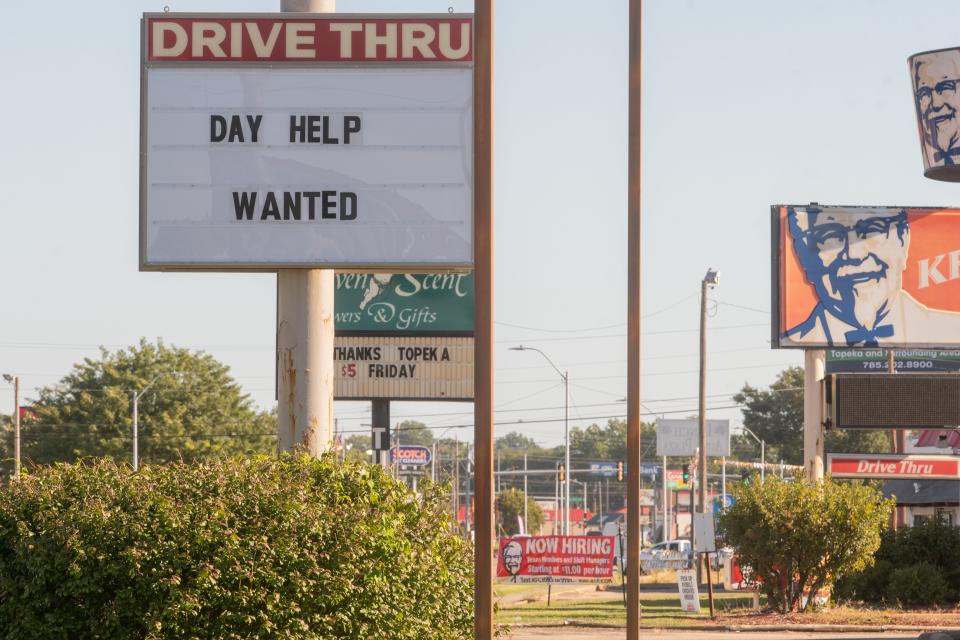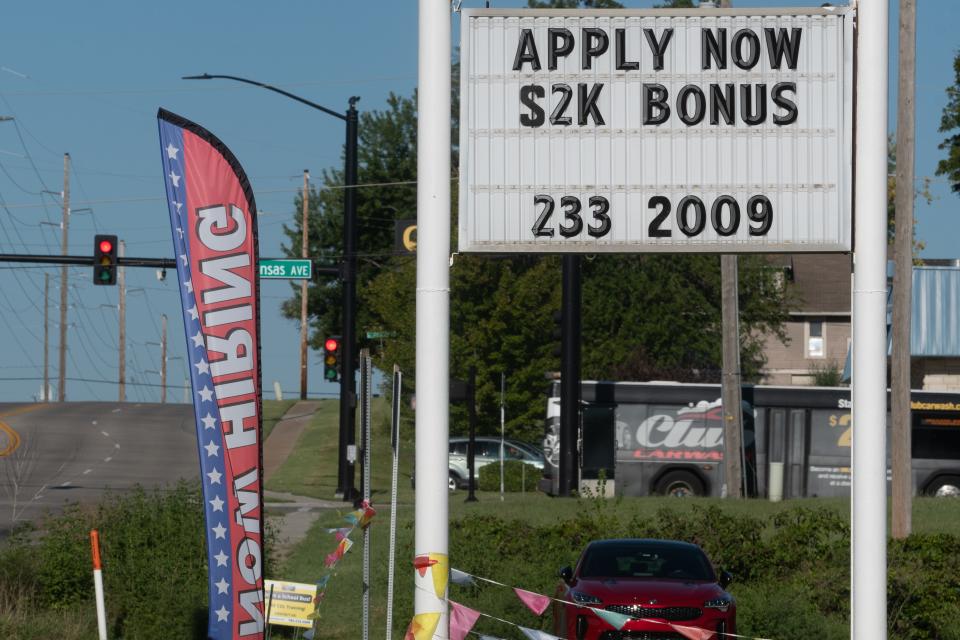Worker pay is worth less due to inflation this Labor Day as businesses struggle to find employees

Workers aren't earning as much this Labor Day, despite rising wages, because of high inflation.
Even when they do offer more pay, businesses are having trouble finding workers amid a tight labor market.
Viet Lam, owner of 4 Guys Bistro in Topeka, told The Capital-Journal last year that he had to limit business hours due to a lack of staffing. Now, business is still the same.
Since last year, Lam has brought in a few employees, but some weren't consistent in their job with 4 Guys Bistro.
"People like to come in for a few days, then they're "no call, no show" and that's a problem," he said.
More: Evergy union workers say they're paid less than Missouri peers and point to safety concerns
Though he still has support from his loyal customers, his shortage of workers are causing wait times to be longer than normal, he said, and customers to get frustrated while waiting to be served.
Employee wage increases not matching inflation
"Kansas workers did see nominal gains in hourly and weekly wages throughout the quarter," Kansas Legislative Research Department senior economist Edward Penner told lawmakers last month. "However, those gains were lower than the inflationary levels, so it actually represents a loss in what might be described as real earnings."
Kansas Department of Labor data for July, released in mid-August, show average nominal hourly earnings increased $1.40 over the past year to $28.72. But that was only a 5.1% increase in wages, which is offset by increase in inflation.
Real hourly earnings decreased by 3.2%, KDOL reported.
Average nominal weekly earnings increased by $45.57 to $990.84, or 4.8%, over the past 12 months.
"For 10 months in a row (and 12 of the past 13 months), Kansans' real hourly earnings have declined," Republican gubernatorial candidate Derek Schmidt said in a tweet. "In other words, we're falling behind because big-government inflation is increasing the cost of everyday life faster than paychecks."
More: With incentive program, Topeka USD 501 staff face dilemma — go to work sick or lose $2,000
Attempts from Democratic lawmakers to raise the Kansas minimum wage have gone nowhere. Currently sitting at $7.25 an hour, the minimum wage would have gradually risen to $15 over six years under HB 2033. The bill never received a hearing in the Republican-led Legislature either of the past two years.
Kansas Central School Bus is offering a $2,000 bonus to new hires after training.
"Nationwide in the industry, we are short-handed," said Paul Gomez, Kansas Central School Bus contract manager. "So, it's hard to get drivers."
Gomez is a new hire to the bus company himself, but he hopes to hire "at least" 10 drivers with the bonus.
Inflation hits 40-year high
Across the Midwest, annual inflation was 8.6% over the past 12 months, the Bureau of Labor Statistics reported.
The Midwest has seen higher inflation than the national as a whole over the last economic quarter, which is not typical, Penner said. The past three months saw the highest inflation since 1982.
There have been 16 straight months of inflation exceeding 4%, compared to the Federal Reserve's target of 2% to 2.5%.
"So that's quite a while now for inflation to be quite a bit higher," Penner said.
"Energy costs were the largest driver of inflation throughout that quarter," Penner said, adding that food prices were also a significant contributor.
"When you go to the store and buy something, part of what you are paying for is the cost of getting that product to the store, and of course energy feeds into that," he said. "So energy especially has its fingers all throughout the inflation report. That's not to say, of course, that this is purely an energy-type inflation scenario. Inflation is widespread throughout the economy."
Record low unemployment

Kansas has seen record-low unemployment recently, forcing employers to increase wages to compete for the low supply of workers.
The seasonally adjusted unemployment rate was 2.4% in July, KDOL reported. That's the same is it was in June, but up one-tenth of a percent from May, which was the lowest unemployment rate in recorded history. Kansas data goes back to 1976.
Meanwhile in Topeka, the unemployment rate is 3.5%.
Shawnee County has an unemployment rate of 3.4%, compared to 3.9% a year ago. The county has a labor force of 94,033 people, of which 90,881 are employed.
Shawnee County unemployment data dates back to 1990. The record low was 2% in December 2021. Local unemployment rates are not seasonally adjusted.
Kansas has roughly 37,000 unemployed people who are in the labor force.
The labor force also lost about 1,600 people in the past month, though it has grown in recent months. The labor force participation rate remains about 0.3 percentage points below pre-pandemic levels.
Jobs numbers
Kansas has not fully recovered all the jobs lost during the first months of the COVID-19 pandemic, despite Gov. Laura Kelly claiming otherwise last month.
The Labor Department reported that Kansas has recovered about 82% of the approximately 157,000 jobs lost between March and April 2020 due to the pandemic and economic restrictions taken to reduce coronavirus spread. About 29,000 fewer people are working now than compared to February 2020, nonfarm jobs reports show.
Comparatively, the U.S. as a whole has recovered just over 100% of the 22 million jobs lost.
Republicans have used that data point in political messaging.
"Under Republican leadership, red states continue to witness a strong economic recovery," RNC spokesperson Alex Kuehler said in a statement. "Laura Kelly's embrace of Joe Biden and Democrats' reckless policies prove that she cannot be trusted to lead the Sunflower State back to prosperity."
The August KDOL report of July numbers showed a total nonfarm 3,500 seasonally adjusted jobs added in July. The private sector saw an increase of 4,000 jobs while government jobs decreased by 500.
Manufacturing and the trade, transportation and utilities sector saw the largest jumps in employment.
Despite growth in government jobs — a data point that Schmidt has criticized Kelly over — the sector has fewer workers than it did pre-pandemic. It has recovered about 10% of the jobs lost to the pandemic.
Additionally, the growth in government jobs is due to seasonal adjustments. Raw numbers show a drop in public sector employment, as is historically lower in the summer months.
Last month, the Kansas Department of Commerce hosted a Kansas Works virtual job fair focused on state agency openings. At the time, there were about 900 job openings across state government.
"Our state agencies are looking for individuals who want to serve Kansas and be a part of bringing people, businesses and communities together," Kelly said in a statement.
"State agencies are a fantastic place to work and offer jobs that have a real impact on the everyday lives of Kansans," said Lt. Gov. and Commerce Secretary David Toland.
Jason Tidd is a statehouse reporter for the Topeka Capital-Journal. He can be reached by email at jtidd@gannett.com. Follow him on Twitter @Jason_Tidd.
Keishera Lately is a business reporter for the Topeka Capital-Journal. She can be reached at klately@cjonline.com. Follow her on Twitter at @Lately_KT.
This article originally appeared on Topeka Capital-Journal: Worker pay in Kansas is worth less due to inflation this Labor Day
